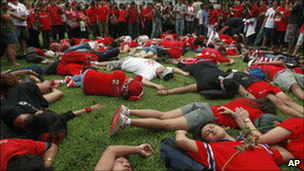Friday, August 20, 2010
Reds Give Their Foes The Finger
I like the red shirts for many reasons, not the least is their use of symbols to rattle their foes. Currently it's the raised middle finger. Back before the shooting began a couple of months ago, they donated blood and a Brahmin priest splashed it around the walls and gates of Government House and the home of their nemesis, Prime Minister Abhisit. It was a powerful symbolic action. They took the insulting label "prai," which means peasant or commoner, and proudly turned it around, putting it on red tee shirts and claiming it from the stage in marathon speeches. Their foes were the "ammart," the ruling elite. Camping first along Ratchadamneon near Democracy Monument in the historic Rattanakosin district last March, the red shirts later extended their two-month anti-government demonstration to Ratchaprasong in the heart of the luxury shopping area of Bangkok. Tourists and shoppers were mightily irritated but there was little violence until the government decided to crack down on protesters demanding that the government resign and call new elections. Then all hell broke loose.
Now all their leaders are in prison except for a couple on the run, and some are about to be charged with terrorism which carries the death penalty. Many red shirts from northern provinces where their strength is greater than in Bangkok are in jail for disturbances including setting fires to provincial halls. While ostensibly promoting a strange kind of "reconciliation," the Abhisit government continues to maintain a State of Emergency in Bangkok which suspends many individual rights, and has declared war on dissent by a censorship campaign that has closed down publications, radio stations, internet web sites and discussion boards. Students have been prevented and even arrested for pointing out the failure of the government to determine responsibility for any of the deaths in April and May of mostly civilians, many killed by sniper bullets and several of them international journalists. In June, Sombat Boonngamanong, a fearless defender of civil rights, returned to Ratchaprasong to tie red ribbons around the intersection sign, and he was promptly arrested. A week later he was back with additional red shirt support and allowed to make his symbolic witness. In July, Sombat's photograph appeared in a local magazine with a raised middle finger and the words, "If you stop me from writing, I will still think; if you want to stop me from thinking, you have to stop my breathing." Sombat said that "the truth of what happened around here has not been fully revealed, so I want to make it public." He added: "I'm not afraid of jail, it's free food." Not long after, small groups of reds, despite the SOE ban on groups of more than five, began meeting on Sunday afternoons in different city parks to practice street theater in order to remind Bangkok residents that "People Died Here" and no one has been arrested. Supporters extend their middle fingers as a gesture of defiance against the government.
There is a false sense of peace now in Bangkok. The traffic jams are back to normal and the luxury shopping malls are crowded. Hotel occupancy rates are rising and the business sector is making great predictions for economic growth despite an unsettled political situation that is by no means on the road to resolution. The opposition party ran a jailed red shirt leader as its candidate in a recent municipal election and he received 46 per cent of the vote despite being prevented from making appearances or speeches. Another round of local elections next weekend could show continued red shirt strength even in the heart of the ruling elite. At its height the red shirt rally drew perhaps over 200,000 participants and it was estimated that 70 per cent of them were living in Bangkok, most because it was the only place a poor country person could earn money.
The government often justifies its censorship by claiming there is a hidden campaign to replace the monarchy with a republic, a conspiracy denied vehemently by red shirts who one and all declare their loyalty to the King. The government is holding political education seminars throughout the country about the need to show loyalty to the monarchy and the nation. This re-education effort is similar to that 35 years ago when anti-communism was the enemy. The King has been hospitalized for nearly a year and makes rare appearances without speaking about his country's current troubles. The government's attempt to promote "reconciliation" is what political scientist Thitinan Pongsudhirak calls "the great bamboozling." He thinks "the issues are still very raw, they are lurking underneath," and the several committees appointed are "time-buying instruments" which "are not really about compromise, they are about [the government] prevailing."
Abhisit has promised to hold new elections only when there is "peace" and stability but few expect them any time soon. A small bomb that killed one bystander was used to justify continuation of the State of Emergency in Bangkok which is needed, the government claims, to insure safety. A SOE has been in effect for years in the southern provinces where a Muslim insurgency has made life unsafe for all sides, surely evidence that no one is secure when decrees replace any possible non-military solutions or or real, meaningful reconciliation that involves all sides in the conflict..
I want to thank the bloggers and photographers whose work I have shamelessly borrowed for this post. I hope they will feel free to take and use my photos in the future.
Subscribe to:
Post Comments (Atom)









No comments:
Post a Comment